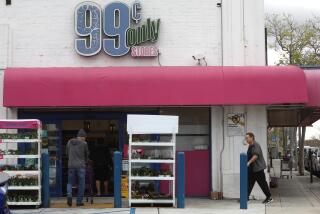Orange County : 1990 : THE YEAR IN REVIEW : Tough Times in Store for Small Businesses in O.C. : Retail: Many shopkeepers are finding that offering specialized service and products and building a loyal following can be crucial to their survival.
- Share via
They are the shops where suits are dry-cleaned, frozen yogurt is scooped and bicycle wheels are greased--the proverbial little place down the street.
They are Orange County’s small retail businesses. In an age of big chain stores, small merchants are holding on by offering specialized service and products. But without powerful, well-financed organizations behind them, the smaller competitors can be vulnerable in an economic downturn.
As retail sales nationwide and in Orange County began to slump in 1990, much of the attention was focused on major retailers struggling under the burden of heavy debt loads. But for small shopkeepers with limited credit, a bad location or thin profit margins, even a relatively mild recession could prove disastrous.
Consumers have started to pinch pennies, and big and small stores alike are feeling the pain. As this happens, larger merchants can reduce expenses by paring their inventory, cutting back on advertising, laying off workers or selling assets to survive a prolonged downturn. Smaller firms--the family-run dry cleaners, the neighborhood florist or the specialty gift shop--have fewer options and resources to fall back on.
“I think (small retailers) who have been barely making it or have been in the wrong mall or the wrong place in the mall are going to be struggling. Some of them are questioning whether they are going to make it,” said Donald B. Murray, partner in charge of audit operations for the accounting firm of Deloitte & Touche in Irvine.
The survivors will be well-established firms that offer customers something they can’t find elsewhere, such as distinctive products or excellent service, experts say. And in Orange County’s crowded retail environment, some of weaker competitors are unlikely to survive the recession.
“For the people who come to see me, it’s almost a feeling of no hope,” said William Lobel, a bankruptcy specialist and partner in the law firm of Lobel, Winthrop & Broker. “Sometimes they think if they hang on, they will make it. Now they realize there is a sustained period (that the recession is expected to last). . . . Nobody thinks it’s going to be two months or three months. Businesses are hanging on by the skin of their teeth.”
Lobel expects an increasing number of bankruptcy filings from small retailers in 1991.
Many retailers who counted on a strong Christmas to pull them through the year--the holidays can sometimes account for 50% or more of a retailer’s annual profits--came away disappointed. But many small businesses were feeling squeezed even before the disappointing holiday shopping period.
Profits for the nation’s small businesses have hit a four-year low, according to the National Federal of Independent Business, a Washington-based trade group. A November survey of 800 firms found that 37% said their earnings had declined, the highest percentage recorded since 1986. Only 17% reported higher earnings.
The California Nut House, a Huntington Beach wholesaler of nuts, dried fruits and gift packs, is struggling to open retail outlets and develop a franchise network. Chief Executive Officer Richard Foltz said the company was “basically going down the tubes” when he took control two years ago. He said he has doubled the number of wholesale customers and developed plans for a franchise network. The company, however, is dogged by legal problems that predated the acquisition, and recently had to file a bankruptcy petition.
The weakening economy has hurt the company, he said, but the firm’s biggest problem has been obtaining credit.
“If I had $500,000, I wouldn’t have a worry,” Foltz said. “Money is real hard to get.”
To be sure, the outlook isn’t entirely bleak for small merchants. Irene Kleeberg, a spokeswoman for the National Retail Merchants Assn., suggests that small merchants may have some advantages over big department stores. Small-business owners are often among the first to identify changes in the marketplace and to respond quickly. As Kleeberg puts it, small businesses “can turn on a dime. The bigger guys are dinosaurs.”
The key to survival for small merchants is to know their customers and build a loyal following. They should constantly monitor whether customers are receiving courteous service and make sure shoppers feel welcome when they enter the store. Sales training is especially important, she said.
Ann Ballou, co-owner of Pottery Plus in Santa Ana, said she is finding out the value of a loyal base of customers. She plans to move her shop to a better location soon and is counting on her customers to follow her.
Deloitte & Touche’s Murray said that finding an investor is one of the best ways for a failing retail business to prop up its operations. Often, he said, retailers can try to improve their business by moving to a better location or shifting to a merchandise strategy that carves out a stronger speciality in the market.
He said small retailers have a difficult time qualifying for bank loans because they usually have few assets to borrow against.
The U.S. Small Business Administration is an alternative source of financing.
“A lot of banks are not financing small business,” said Steve Waddell, the SBA’s district director in Orange County. “The SBA alternative is therefore more important.”
SBA loans typically range from $75,000 to $1 million, with an average of about $330,000, Waddell said.
The SBA made 302 loans totaling $104 million in the year ended Sept. 30 to Orange County businesses, up from 248 loans for $70 million in 1989 and 219 loans for $50 million in 1988.
Some retailers say that cutting back on such expenses as advertising and marketing during a recession is one of the worst moves a store owner can make.
Anne Weiler, owner of Kids Kloset/Kids Klub in Laguna Beach, said she plans to boost advertising because of the recession, knowing that it will take more to get customers into her store.
“I have seen so many retailers who would pull back when they didn’t see the dollars coming in,” she said. “I don’t have a big marketing budget, but a lot of it is just hustle. The ones who succeed are the ones who keep hustling.”
More to Read
Inside the business of entertainment
The Wide Shot brings you news, analysis and insights on everything from streaming wars to production — and what it all means for the future.
You may occasionally receive promotional content from the Los Angeles Times.










